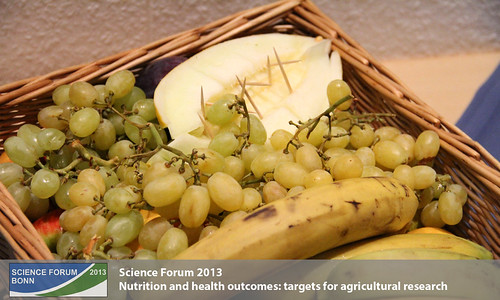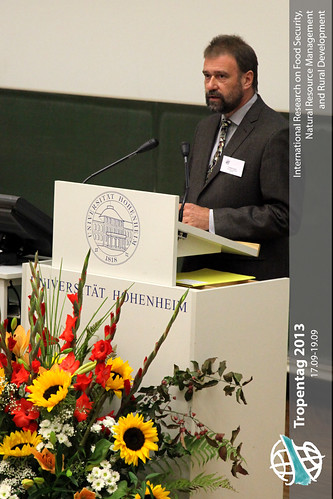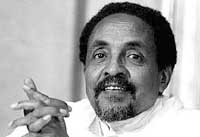keynote speakers
The motion for lunch is rejected
Mon, 09/23/2013 - 14:31 — Philipp Gassner
‘The motion for lunch is rejected’, ruled Joachim Von Braun of the University of Bonn wittily, when chairing the first plenary session at the Science Forum 2013. He rather carried on with the session, setting the scene of the Forum and pointing out, why sufficient lunch is also still rejected to 925 million people world wide. To answer why 15% of the world’s population suffer from undernourishment after decades of agricultural research is indeed a tough one. The vast amount of knowledge gathered during this time was obviously not enough. At the same time ‘We don’t need to know everything’, Von Braun pointed out. What we really have to know, keynote speaker Patrick Webb from Tufts University sketched - to provide everybody with the lunch they deserve.
Read more
 A healthy lunch @ Science Forum
A healthy lunch @ Science Forum
 A healthy lunch @ Science Forum
A healthy lunch @ Science Forum
Welcome Address –“Tropentag 2013
Tue, 09/17/2013 - 20:39 — Pamella Ogada
"Agricultural development within the rural-urban continuum”
By Prof. Dr. F. Asch; for Organizing committee, Prof. Dr. S. Dabbert, President, University of Hohenheim
”According to projections of the UN, 70% of the global population will be living in urban areas by 2050” ”on this basis, Prof. Dr. F. Asch, officiated and welcomed the over 800 participants, and at the same time thanked the main sponsors of Tropentag conference.


TROPENTAG 2012, who said what? i am your gossip girl
Mon, 09/17/2012 - 17:16 — De-Registered User
offering a broadcasting platform for the scientific community of the tropics and subtropical regions working in the agricultural and natural resource management fields is the birth idea of Tropentag www.tropentag.de. whilst trying to sell new ideas and innovations, tropentag creates an atmosphere of totallity where the experts of ideas, buyers of ideas and benefactors of these ideas can have a personal exchange regardless their level and background.
Wth the gathering of several expert keynote speakers and 19 oral sessions in almost 100 talks, 24 guided poster sessions in 360 posters,Tropentag 2012 put a keen lens on the future of agriculture and the theme " Resilience of Agricultural Systems Against Crises" is crucial with the current global warming crises.
 But what did all those speakers say? Whether present or absent, the Student Reporter www.facebook.com/tropentag?ref=hl is your ears and eyes at every tropentag conference. with the student reporters, your can sit at the comfort of your home or be at one session and still get all the information throughout the conference. We keep you posted on which ever social media your at, you just need to join the fleet.
But what did all those speakers say? Whether present or absent, the Student Reporter www.facebook.com/tropentag?ref=hl is your ears and eyes at every tropentag conference. with the student reporters, your can sit at the comfort of your home or be at one session and still get all the information throughout the conference. We keep you posted on which ever social media your at, you just need to join the fleet.
 But what did all those speakers say? Whether present or absent, the Student Reporter www.facebook.com/tropentag?ref=hl is your ears and eyes at every tropentag conference. with the student reporters, your can sit at the comfort of your home or be at one session and still get all the information throughout the conference. We keep you posted on which ever social media your at, you just need to join the fleet.
But what did all those speakers say? Whether present or absent, the Student Reporter www.facebook.com/tropentag?ref=hl is your ears and eyes at every tropentag conference. with the student reporters, your can sit at the comfort of your home or be at one session and still get all the information throughout the conference. We keep you posted on which ever social media your at, you just need to join the fleet. Meet the Speakers: Dr. Tewolde Berhan Gebre Egziabher
Sun, 06/12/2011 - 06:00 — De-Registered User Dr. Tewolde Berhan Gebre Egziabher is Director General of the Ethiopian Environmental Protection Authority and Councillor at the World Future Council.
He received his PhD in 1969 and is Ethiopia’s first plant ecologist. Most of his working life has been in academia, and he has been the Dean of Science at Addis Ababa University and President of Asmara University.
He also served as Director of the Ethiopian Conservation Strategy Secretariat.
During the 1990s Dr. Egziabher put much of his energy into negotiations at the various biodiversity-related fora, especially the Convention on Biological Diversity (CBD) and the FAO. During this time, he built up a strong group of well-prepared African negotiators who began to take the lead in the G77 and China Group. Africa came out with united, progressive positions such as no patents on living materials and the recognition of community rights.
Dr. Tewolde Berhan Gebre Egziabher is Director General of the Ethiopian Environmental Protection Authority and Councillor at the World Future Council.
He received his PhD in 1969 and is Ethiopia’s first plant ecologist. Most of his working life has been in academia, and he has been the Dean of Science at Addis Ababa University and President of Asmara University.
He also served as Director of the Ethiopian Conservation Strategy Secretariat.
During the 1990s Dr. Egziabher put much of his energy into negotiations at the various biodiversity-related fora, especially the Convention on Biological Diversity (CBD) and the FAO. During this time, he built up a strong group of well-prepared African negotiators who began to take the lead in the G77 and China Group. Africa came out with united, progressive positions such as no patents on living materials and the recognition of community rights.
Meet the Speakers: Prof. Rattan Lal
Sat, 06/04/2011 - 10:07 — De-Registered User Rattan Lal is Professor of Soil Science in the School of Environment and Natural Resources at The Ohio State University.
From 1968 to 1969 he was Senior Research Fellow at the University of Sydney and soil scientist at the International Institute of Tropical Agriculture (IITA) in Ibadan, Nigeria from 1970 to 1987.
Rattan Lal is Professor of Soil Science in the School of Environment and Natural Resources at The Ohio State University.
From 1968 to 1969 he was Senior Research Fellow at the University of Sydney and soil scientist at the International Institute of Tropical Agriculture (IITA) in Ibadan, Nigeria from 1970 to 1987.
Meet the Speakers: Prof. Sir Gordon Conway
Sat, 05/28/2011 - 15:55 — De-Registered User Prof. Sir Gordon Conway
Gordon Conway is Professor of International Development in the Centre for Environmental Policy of the Imperial College of London and holds five honorary degrees and fellowships. Trained in agricultural ecology, he attended the universities of Bangor, Cambridge, West Indies (Trinidad) and California (Davis).
In the 1960’s he was a pioneer of sustainable agriculture, developing integrated pest management programs for the State of Sabah in Malaysia. He joined Imperial College in 1970 setting up the Centre for Environmental Technology in 1976.
Prof. Sir Gordon Conway
Gordon Conway is Professor of International Development in the Centre for Environmental Policy of the Imperial College of London and holds five honorary degrees and fellowships. Trained in agricultural ecology, he attended the universities of Bangor, Cambridge, West Indies (Trinidad) and California (Davis).
In the 1960’s he was a pioneer of sustainable agriculture, developing integrated pest management programs for the State of Sabah in Malaysia. He joined Imperial College in 1970 setting up the Centre for Environmental Technology in 1976.




